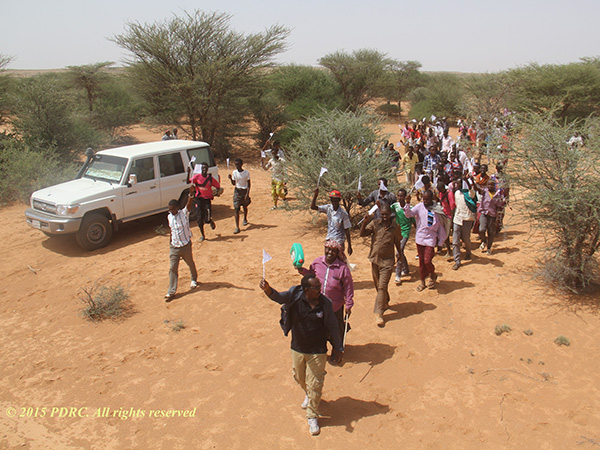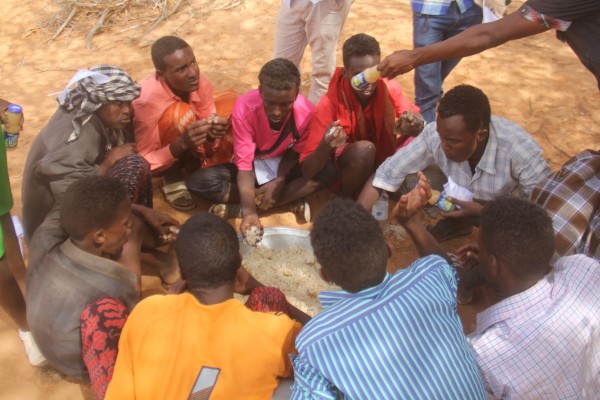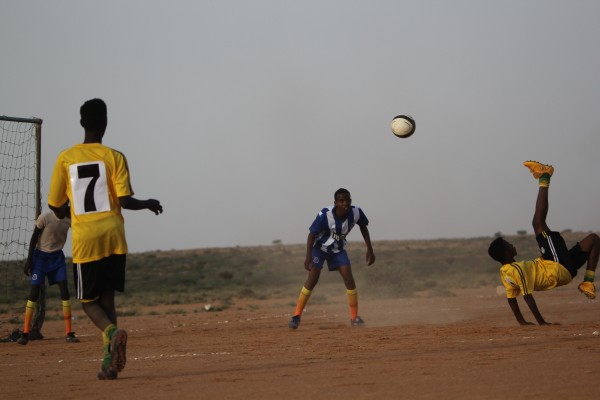Reopening the Gaale-Maale road: Youths take the lead in resolving a five-year conflict in Puntland

Warsan Abdillahi Abdi was driving along the Gaale Maale road in Puntland with her cousin and her best friend. As they trundled their way down the road, gunmen suddenly appeared from the bushes, lined the road and began to shoot at her car. Amidst the chaos and shooting, Warsan lost both her cousin and her friend, and watched the gunmen proceed to shoot and kill five others in another car that was driving on the same road.
Although several years have gone by, Warsan still bears scars from the attack. She still carries the pain inflicted by a number of bullets that remain lodged in her lower calf. She also suffers nightmares and sometimes lapses into psychological trauma when she recalls the incident.
The Gaale Maale road forms an important link between the communities of Rako and Humbays in Puntland. For five years however, a feud between the Ali Saleeban clan mainly from Rako district and the Musa Saleeban clan from Humbays, made the 30-kilometre road inaccessible. The feud began due to a disagreement over grazing lands. Over time the feud escalated and young gunmen from both sides made the Gaale Maale road unusable for travellers, strewing it with branches and tree stumps to render it completely impassable.
During this period travelling by road from Rako to Humbays was unreliable and very insecure. Not until a number of youth peace activists decided to pursue a truce was there any change in the situation.
Youth lay the path to peace
The youths initially met through the Rako reconciliation process, supported by Interpeace and its partner in Puntland, the Puntland Development Research Center (PDRC). After engaging in unilateral outreach awareness campaigns on peace, with facilitation and support from PDRC, the youths decided to meet and take action together. They began to hold meetings and to discuss ways of ending the violent standoff between the two clans, which they realized impacted them the most.
“We felt that we could no longer stand on the sidelines and watch our youth, from both sides, become the most affected victims in this conflict,” said Mohamed Saeed Arabay, Chairman of the joint Youth Peace Group that they formed.
With the help of PDRC’s Mobile Audio-Visual Unit (MAVU), the youth representatives of the two clans organized a more substantial series of meetings, the first of which was a film screening and discussion event at the port city of Bossaso, which provided a neutral ground.
MAVU is a way of connecting people in isolated rural communities – including youth, women and minorities – with each other and with decision-makers using mobile cinema. It works by filming a community’s views and screening the film to members of a rival community. These screening are held back and forth between the two communities until they have identified enough common ground to meet in person.
The many interviews captured by the MAVU videos and shared with the two clans proved very useful for this effort. The youths watched as community members from both Rako and Humbays stressed the negative consequences of the prolonged conflict, citing the large number of lives lost, the constant fear of reprisal attack and destruction of property.
Mahado Abdisalin Yusuf, a resident of Humbays told of how the traditional spirit of sharing between the two communities had begun to break down. “There is a borehole here in Humbays, but it belongs to a man from Rako,” he said in one video. “As you can see, it has been covered with branches so we cannot draw water from it.”
The Government of Puntland took note of the youth activists’ efforts and began to support their quest for a peaceful rapprochement between the two clans. A peace process, partly facilitated by the Vice President of Puntland, helped to bring the two communities together, and at the end of March 2015 a peace agreement was signed. This brought the five-year conflict to an end and allowed the Gaale Maale road to be re-opened.
Strengthening peace
Following the signing of the peace agreement, the youth activists continued to bring the communities of Rako and Humbays closer together. They organized a soccer match, facilitated by PDRC’s MAVU unit, in cooperation with the Ministry of Youth and Sports and attended by both the Minister and his Director General. The two opposing teams had a mix of youth from both Rako and Humbays to prevent the emergence of a competitive game of “us versus them”.
The two teams were named “Unity,” and “Peace”.
A luncheon was also held to honour the youth for driving the re-establishment of peaceful relations between the people of Rako and Humbays.
Sirad Khalad Ali, a poet revered for her prowess in easing tensions through spoken word, was also a victim of the conflict. She lost her husband and had to bury 11 members of her family in a single day. But at the luncheon organized by MAVU she shared poems of praise for the courageous youths whose effort halted the five-year cycle of violence.
Abdinasir Mohamed Yusuf, lead researcher of MAVU, lauded the role played by the youth in resolving the conflict between the two communities.
“This time, the youth and women were not the marginalized group. They were right at the forefront of the peace effort, and we merely provided technical, logistical and financial support,” Yusuf remarked. “Their courage made this possible, and the reopening of the Gaale-Maale road is a powerful indication of the renewed peace and cooperation between the two communities.”

























